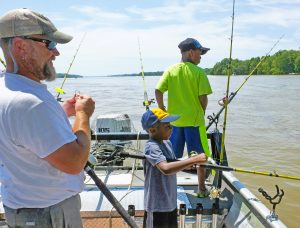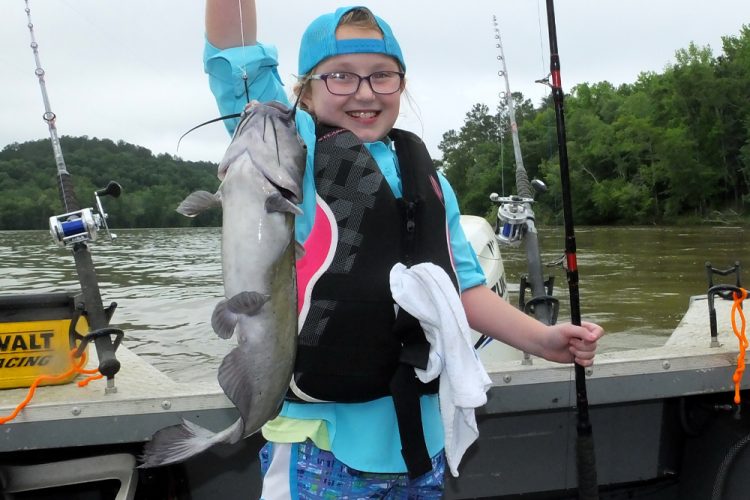Catfish of all sizes make a kid happy; you don’t have to catch big fish or even lots of fish; just have fun doing it.
Mentoring Matters
Story and Photos by Coy Lee Payne
I was blessed in my youth to have two adult fishing mentors who shared their love of the sport with me. My Papaw was first when I was scarcely belly-button high to him, and the other was a close family friend, Coy Price, who guided me through my spirited teenage years.
The first led me along a path that ignited a fishing passion within me. The second helped me explore the intricacies of the sport while sledgehammering the fundaments of patience into my hard, teenage head. His stable guidance focused and fueled my burning passion. Combined, these mentors ensured fishing would be at the core of my personal and professional life.

Catfishing was a perfect venue for my introduction to fishing because such opportunities abound along the Tennessee River. Like many adult anglers’ first fish, mine was a catfish. With knowledgeable mentors at the helm, my journey to becoming a fisherman was filled with anticipation, adventures and fun.
Now, fast-forward a few decades, and I’m the mentor. It wasn’t a conscious decision; it was a natural evolution. I’ve had the opportunity to take kids fishing: my kids, my grandkids, their youthful buddies, and adult friends and their kids.
Sharing the unbridled excitement of a kid simply going fishing, even before catching the first fish, hooked me on mentoring. This journey has taught me that starting simple and gradually expanding skills as kids show interest is a good tactic. I’ve learned their interest level spirals upward when fishing is fun and adventurous.
I’ve forgotten many youthful moments during my 7.4 decades, but not my memories of fishing trips with Papaw. My experiences serve as my best explanation for why mentoring kids matters.
The timing was ideal because when I was six, my parents moved south of the Mason-Dixon line to Tennessee, and my maternal grandfather, Papaw Payne (Clarence Luther Payne) had retired from the hosiery mill life. I immediately learned that Papaw liked fishing, and I liked Papaw, so I decided he needed a fishing buddy. Fishing with him became a regular and eagerly anticipated event soon thereafter.
Papaw was fascinated with catfish, and I developed my lifelong attachment to the species from him. We fished from the shoreline or a borrowed boat using spin-cast rigs or long cane poles. He also taught me the skills of trotlining and sculling.

Papaw was mindful that kids value attentiveness and a personal touch, and depending on the kids’ interest level, two specific factors ensure fun and memorable trips for any youngster. The easy one is kids need to catch fish to stimulate interest in catching more fish. Catching fish applies to all kids. For some, that’s enough. As a mentor, it’s meaningful.
The other isn’t as obvious, nor is it for every child: it’s teaching kids about the art and science of catching fish. Understanding why a catfish is in a specific location can generate life-changing enthusiasm for some kids.
Papaw and I had our hotspots. Sometimes, we caught catfish quickly, which was always enjoyable. However, the memory-makers were fish-catching adventures earned through searching, thinking and changing tactics until it clicked. Now, it’s called developing a pattern. Papaw just called it fishing.
He’d scull the boat slowly, and we’d pitch, cast or drop hand-picked catalpa worms and nightcrawlers along the cracks and crannies around rocky points, logs and stickups. We were always seeking Papaw’s “sweet spots.”
The first time I correctly predicted a potential target in advance was my no-turning-back moment. From the rearview perspective, it impacted the remainder of my personal and professional life. Papaw was in front of the boat, yet he yielded the first cast into the small pocket along a steep bluff to me.
“I think you may be right about this, son,” he said, nodding. “You called it, you fish it.”
Catching the 3-pound channel catfish, waiting in ambush mode, was a game-changer. My desire to learn “why,” not just “how,” transformed into a lifelong quest in those exciting moments. I recall the joy in the boat, but what’s most memorable was Papaw’s grin. I can still visualize it. I caught the fish, but he sported a whopper smile while nodding in affirmation.
Catching fish is crucial, but mentoring success isn’t defined simply by the number of fish netted or back-peddled and drug onto the shoreline. It’s too important to be a numbers game. It goes to the core of being a kid. The journey is the key. Taking a kid fishing is a team sport. You, the kid and the fish comprise the team, and all are indispensable.
Mentoring matters because experienced mentors confirm a sense of irony often exists at trips’ ends. It’s the moment when the youngster says, “Thank you,” but the mentor feels they should be thanking the kid. Taking a kid fishing isn’t a chore; it’s an opportunity.

The youngster peeks into our world of fishing, often stimulating their interest to learn. Witnessing this transformation inspires the mentor to give. The mentoring process is birthed, takes form and grows.
My love of taking kids fishing is indeed that simple. It’s rooted in the fact that when I was young, mentors took me fishing for the right reasons. I’ll bet that’s the genesis of most adult fishermen’s passion for the sport. I’m eternally grateful for my mentors.
Not all kids need to become dedicated fishermen for mentoring to be worthwhile, and that’s OK. Explore it to a kid’s comfort level and make it fun. At that point, it’s a win-win.
But be prepared for mentoring to migrate to your core, expanding your passion for our sport. I witnessed it with Papaw; he received the gift of giving he didn’t expect. It’s a concept I couldn’t comprehend as a child, yet I remember his joy on every trip.
I get it now. Thanks, Papaw.
(Note: Coy Lee Payne is the pen-name for Terry (Lee) Madewell and is the sole pen-name he’s used his entire career. His mentors impacted not just his outdoors life but all facets of his life so deeply he used their names, Coy Price, and Clarence Payne, along with his middle name to honor their mentorship. Mentoring does matter.)



